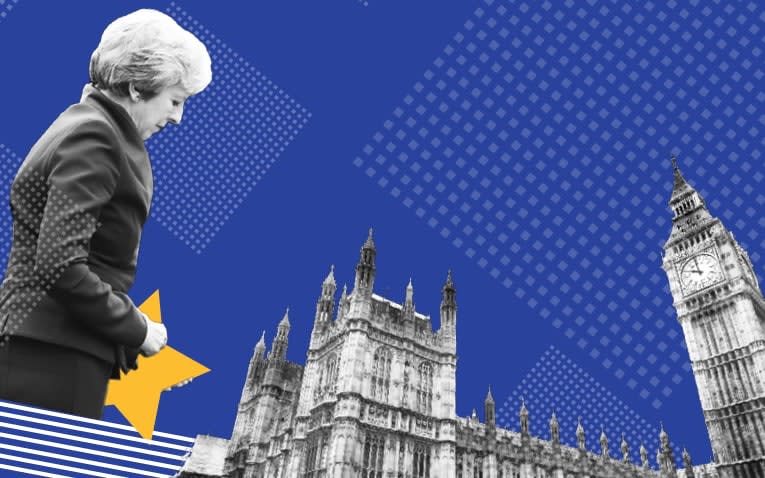As the Brexit 'meaningful vote' in Parliament is delayed - what are the next steps for Theresa May?

After months of negotiations, the Brexit deal was due to be voted upon tomorrow, in order for the United Kingdom's Parliament to approve or reject Theresa May's controversial plan.
However, the prime minister has dramatically called off the "meaningful vote", today, in the face of what had been expected to be a significant defeat at the hands of rebel MPs.
A Government source confirmed that the vote was being pulled, with the Prime Minister due to inform the House of Commons in an oral statement at 3.30pm where she is expected to confirm that she intends to seek further concessions from Brussels to try to win over rebellious backbenchers.
But what does all this mean for the "meaningful vote" exactly, and will it be rescheduled? Here is all you need to know about what it is and the process involved.
What is the "meaningful vote" on Brexit, and how will it work in the House of Commons?
The "meaningful vote" Parliamentarians have on both the Withdrawal Agreement and the outline for the future relationship between Brexit Britain and the European Union was made law under Section 13(1) of the European Union (Withdrawal) Act 2018, which requires the draft deal to be put to both the House of Commons and House of Lords.

If MPs pass it, (when they get round to holding the vote) the deal will have much less of a problem making its way through the House of Lords.
What time was the meaningful vote expected to take place?
It was scheduled for Tuesday 11 December at around 7pm, with the result expected shortly afterwards.
Will the vote be rescheduled?
It is not clear when the vote will now be held. The Telegraph understands that the Prime Minister had been under pressure from ministers and her chief whip to delay the meaningful vote potentially as far as the new year.

Will Parliament vote for or against the deal?
As it stands, the Government appears likely to lose any vote on the current deal - hence the new delay. Over 100 Conservative MPs have voiced opposition to it. The DUP and its 10 MPs have made clear they would vote against it. Hardcore Remainers, meanwhile, were planning to vote the deal down in the hope of a second referendum instead.
That means Mrs May would have needed Labour votes to succeed. However, the Labour leadership has been adamant that it opposes the deal and wants a general election. Convincing up to 100 opposition members to rebel and vote with the Government would have been a very tall order.
While defeat tomorrow seemed certain, the hope had been that it would have been small enough for the Prime Minister to survive and head to Brussels to renegotiate.
However, Downing Street has grown worried that the defeat would be too heavy for Mrs May to carry on after. Instead, the vote has been delayed and Mrs May will try and win concessions from the EU first.
She is unlikely to get anything major from Brussels. The key issue, the Irish backstop, is not open for renegotiation. The demands from the Brexiteers for a time limit or a unilateral exit mechanism would render the backstop incapable of performing its intended job and so the EU will not allow it.
Nor is Brussels willing to reopen the legally-binding Withdrawal Agreement more generally. It fears demands from member states over issues such as fishing and Gibraltar. So all that will be on offer are small tweaks to the non-binding Political Declaration and perhaps a statement from EU lawyers on the backstop not being permanent.
None of which will be big enough to change the minds of most Brexiteer MPs. They might, however, reduce the size of the rebellion and thus make the two vote strategy viable again.
What happens if MPs do not pass it?
The original plan, once it became clear the Government would lose the vote at the first attempt, was to try again a few days later. The expectation was that Mrs May would try and negotiate a few concessions from the EU, while market turmoil would spook MPs and make them think again. Although, with traders being fully aware of the plan and so "pricing it in", the odds of a major shift in the markets looked slim.
While the "renegotiation" will now happen ahead of the vote, Downing Street may still need more than one attempt to get it through Parliament.
In the intervening period between a first and second attempt to pass the deal, Labour would probably try and force a general election. This would be very difficult because of the Fixed Term Parliament Act and would require Conservative MPs to help topple their own government.
If and when that attempt fails, Labour might try and secure a vote for a second referendum. This would still require support from Tory MPs but would likely be easier than forcing a general election. Those efforts were boosted on Monday by the European Court of Justice ruling that the UK can revoke Article 50 unilaterally.
The ruling removes the risk of Britain either not being allowed back in or having to make hugely unpalatable concessions such as agreeing to join the euro.
In the meantime, there might also be attempts to push the Government towards a softer Plan B, probably along the lines of "Norway Plus". This would mean staying in the single market and the customs union and continuing freedom of movement. It would, however, have an exit mechanism, unlike the Irish backstop, and potentially command a majority in the house. Several Cabinet ministers are rumoured to have been looking at the idea, but Labour continues to say that it is against a Norway-style Brexit.
If and when attempts at a second referendum or Norway-style Brexit fail, Labour MPs would have to seriously consider voting for Mrs May's deal. The alternative would be a no-deal Brexit.

